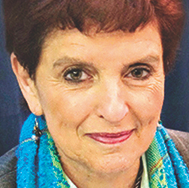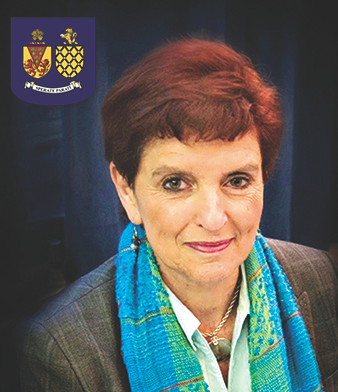News
Helen’s headed posh UK school for 30 years
Last week’s Queen’s awards remind us of Dame Helen Hyde (née Seligman) who received her top-gong from QEII in 2012. Dame Helen (née Seligman) was born in Joburg in 1947, attended Saxonwold Primary and Parktown High; and obtained her BA Degree from Wits. She & husband John immigrated to the UK in 1970 where she became a top educator who passionately teaches about the Shoah to all students. She’s kept close ties with SA and has visited ‘home’ every year since leaving.

ANT KATZ
In the UK, Helen became and educator. “In 1987 Helen was appointed as Headmistress at Watford Girls Grammar School and was at the time one of the youngest women to be appointed head of a high school,” says her proud sister Wendy Davis.
Dame Helen still holds this post, almost 30 years on, making her one of the longest serving Head teachers in the UK.
“Two years ago she was placed on the Queen’s birthday list and was knighted as a Dame in recognition of services to national education and Holocaust education,” says Wendy. “She serves on the same commission as Mick Davis, knows him personally and has worked very closely with him.”
Watford Grammar School for Girls, (commonly abbreviated WGGS), is an academy for girls which, according to Wikipedia: “Despite its name, the school accepts girls of all abilities, although a proportion are selected for academic or musical aptitude. Its GCSE results were the highest achieved by non-grammar state schools in England in 2007.”
Shoah education essential for all
According to information sourced from the Watford Grammar School for Girls website:
Holocaust Education is embedded in our curriculum, taught overtly from year nine in the religious studies department and linked to Anne Frank, making it accessible to this age group.

The students look at their own prejudices and then move to studying Nazi prejudice and where it led. They study topics such as life before the Holocaust, perpetrators, bystanders, rescuers, resilience.
In year 10, students learn the historical narrative in history and many visit Amsterdam and the Anne Frank House. Drama students produced a play on Kojarzyć and to do so studied life in the Warsaw ghetto. They then visited Warsaw and Treblinka. Roman Halter spoke about his art to our A-level fine arts classes; the drama department produced a play about his life.
For the past seven years, the school has organised and hosted a Holocaust Conference. The 200 students of their lower sixth form attend, they invite local schools and the conference is also open to the public. Each year, they try to have a renowned Holocaust researcher or historian as the keynote speaker. Survivors talk to the students in groups, making the questions and answers a personal and moving experience.
Staff in different subject areas have received Holocaust training and run workshops at the conference.
Topics range from propaganda, historical perspectives, the geography of the Lodz ghetto, the perpetrators, the kindertransport and more.
The conference is important to the students because it asks them to listen, to learn, to reflect, and then to decide what action to take.
Helen and a colleague have been taking students to Holocaust-related countries for many years; each group of 40 studies the events in the particular country (Germany, Hungary) and then visits Poland.
She has even taken groups of adults on study tours to Poland. “Many adults know very little about the trauma and the enormity of the loss,” she says.
Why is it so important?
Why is it so important to teach about the Holocaust? Because we must never forget, we must learn to see early warning signs and to take positive action. We must study it because it helps to develop understanding of the ramifications and dangers of prejudice, racism and stereotyping in any society.
It helps us to think about the use and abuse of power, and the roles and responsibilities of individuals, organisations and nations. For me, this is a passion and a necessity. “For years I could not speak about this and my father never told me much about the loss in our family. Eventually I contacted a surviving cousin and visited the sites in Amsterdam and Poland,” she says.
“I have had the benefit of being trained by the Imperial War Museum and by London University. I am privileged to have survivors as my friends. It is my duty now to help them and take up the essential role of talking and teaching about the Holocaust, and our duty to teach the young and help them to try to understand it and try to prevent similar horrors.”
KAPLANSHOSHANA
July 19, 2015 at 9:29 am
‘I am South African born in Johannesburg in 1948 and I am an history teacher. The holocaust has also had major influences on my life-mainly to empathize with the victims who went through such hell on earth and such gratitude to Hashem that we are free to lead a religious life now and not have to hide our Jewishness but live it in all aspects -Shabat and Kashrut and taharat hamishpacha and chesed and hachnosis orchim and the many ways of keeping Hashem’s laws in our everyday lives-not to be judgemental or jealous and to be honest in our dealings with everyone just to mention a few. I took a few tour groups to Lithuania because most of the South African Jews came from there and although we did not see concentration camps and gas chambers because there were non in Lithuania we saw much of the destruction of the local Jewish communities. Kovna and Telshe and Slabodka and Shavel and Kupichik and Vilna just to mention a few. These places of vibrant Jewish life and the birthplace of so many of our great Jewish Leaders. We also went to Latvia and its capital Riga and saw the holocaust memorials there and to the places where the Ohr Sameach lived and learnt and wrote .He was in Dvinsk Its always been a dream of mine to be able to give over the trauma that our people lived through to the younger generation and for them to be grateful that they can lead their lives with the full richness of their heritage in this day and age and that our heritage is so prevalent to teach us how to live and grow and survive and be the example to the nations of the world that our Creator wanted. Today when there is so much available both physically and spiritually how can we imbue our young people with gratitude and the strength to opt for growth as the people who accepted the Torah at Sinai and be a nachas to Hakodesh Boruch Hu.
Thank you
Shoshana Kaplan’